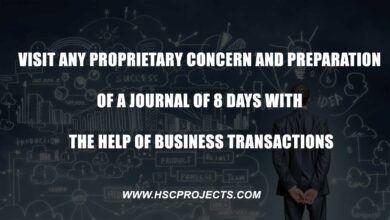
Experience the Law of Equi-Marginal Utility by Spending Amount on Various Good
INTRODUCTION TO LAW OF EQUI MARGINAL UTILITY:
The law of equi-marginal utility was conferred in the nineteenth century by Australian economists H. H. Gossen. It’s additionally called the law of maximum satisfaction or law of substitution or Gossen’s second law. A client has a range of necessities. He tries to pay restricted financial gain on various things in such how that utility of all things is equal.
Once he buys many things with given cash financial gain, he equalizes marginal utilities of all such things. The law of equi-marginal utility is an extension of the law of decreasing utility. The buyer will get the most utility by allocating financial gain among commodities in such how that last dollar spent on every item provides identical utility.
AIMS AND OBJECTIVES:
This project aims to prepare a report on – How will you spend a particular amount on various goods to experience the law of equi-marginal utility.
There are many objectives for this project. Major few objectives are given below.
Objectives:
- To understand the law of equi marginal utility with examples.
- To know the working of equi marginal utility
- To understand the basic need of this law and what it proves
- To know how it helps in microeconomics
- To ascertain any doubt regarding the law of equi marginal utility
METHOD AND METHODOLOGY:
The method used to gather the required information on the project is an internet survey method. The Internet has extensive information on this subject. It has a vast collection of data on the law of equi marginal utility. The survey has unveiled information about this topic, which has covered major few points which are listed below and explained in a detailed report of the project.
- Meaning of the law of equi marginal utility
- Assumptions to the law
- Limitations of the law
DETAIL REPORT OF PROJECT:
Meaning of the law of equi marginal utility
According to Gossen,
“It is impossible to gratify all want to the point of satisfaction. It is necessary, to obtain maximum satisfaction, to discontinue the satisfaction of different wants at a point at which their intensity has become equal.”
Explanation of the law of Equi Marginal Utility:
Law of Equi-marginal utility has three main bases:
- Wants of human are infinite
- The man has restricted means that, however, these mean that is often used as an alternative.
- Every person needs to induce most satisfaction (utility) from his restricted means that.
Suppose apples and oranges are the two commodities to be purchased. Suppose more that we’ve got seven rupees to pay. Allow us to pay 3 rupees on oranges and 4 rupees on apples. What’s the result? The utility of the third unit of oranges is six, which of the fourth unit of apples is a pair of. Because the utility of oranges is higher, we must always obtain additional oranges and fewer apples. Allow us to substitute one orange for one apple so that we tend to obtain four oranges and three apples.
Now the utility of each orange and apples is that the same, i.e., 4. This arrangement yields the most satisfaction. The full utility of four oranges would be ten + eight + six + four = twenty eight and of 3 apples eight + six + four= eighteen which provides us a complete utility of forty six. The satisfaction given by four oranges and three apples at one rupee every is bigger than might be obtained by the other combination of apples and oranges. In no different case will this utility quantity to forty-six. We tend to might take another combo and see.
We, therefore, return to the conclusion that we tend to acquire most satisfaction once we equalize marginal utilities by work some units of the additional help for the less helpful artifact. We will illustrate this principle with the assistance of a diagram.


Assumptions to the Law of Equi Marginal Utility
- There is no modification within the costs of the products.
- The financial gain of the client is mounted.
- The utility of cash is constant.
- The consumer has good data of utility obtained from the merchandise.
- A consumer is a traditional person. Therefore, he tries to hunt the most satisfaction.
- The utility is measurable in cardinal terms.
- The consumer has many needs.
- The goods have substitutes.
Limitations of the Law of Equi Marginal Utility

1) Ignorance:
If the buyer is ignorant or blindly follows custom or fashion, he can build a wrong use of cash. On account of his mental object, he might not recognize wherever the utility is larger and wherever less. Thus, the mental object could forestall him from creating a rational use of cash. Hence, his satisfaction might not be the utmost, as a result of the marginal utilities from his expenditure cannot be equal because of mental objects.
2) Inefficient Organization:
In the same manner, an incompetent organizer of business can fail to attain the simplest results from the units of land, labor, and capital that he employs. This can be, therefore, as a result of he might not be ready to divert expenditure to additional profitable channels from the less profitable ones.
3) Unlimited Resources:
The law has clearly no place wherever these resources are unlimited, as an example, is that the case with the gifts of nature. In such cases, there’s no would like abusive expenditure from one direction to a different.
4) The hold of Custom and Fashion:
A client is also within the sturdy clutches of custom or is inclined to be a slave of fashion. Therein case, he won’t be ready to derive most satisfaction out of his expenditure, as a result of the cannot surrender the consumption of such commodities. This can be especially true of the traditional necessaries like a dress or once a person is captivated with some intoxicant.
5) Frequent Changes in Prices:

Frequent changes in the costs of various merchandise render the observance of the law tough. The buyer might not be ready to build the required changes in his expenditure in an exceedingly perpetually dynamical worth scenario.
ANALYSIS OF DATA:
We know that the wishes of each man are unlimited. Desires arise once more, and once more, however, man has restricted means that (income) to meet his desires and means that have various uses. Thus, man continuously faces the drawback of the distribution of restricted means that of different uses, on his wants; so, he could get the most satisfaction (or utility).
The Law of Equi-Marginal Utility presents the answer to this drawback. This law states that if an individual, desires to induce most satisfaction from his financial gain, he ought to pay his financial gain on completely different things, in such some way that the utility of the last unit of cash spent on every good, ought to be equal or virtually equal. This law of consumption was propounded by a French economic expert, H. H. Gossen, in 1854, and it’s conjointly called the Second Law of Gossen.
CONCLUSION:
To conclude my findings,
The law of equi utility is useful within the field of production. The producer has restricted resources. He uses restricted resources to get production factors. He tries to equalize the utility of all factors. He desires to urge most output and profit. National income is distributed among factors of production per this law. An enterprise pays factors of production adequate to marginal product measured in cash terms. He can substitute one issue for one more until the marginal productivity of all factors is adequate to the costs of their services. The law is employed within the field of exchange.
The folks wish to exchange goods having low utility with goods having high utility. There’s most take pleasure in the exchange of commodities. The law is useful in exchange for wealth, trade, import, and export. The law applies to consumption. A rational shopper tries to urge most satisfaction once he spends his restricted resources on varied things. He tries to equalize the weighted utility of all the items.
The law is applicable to finance publically. The govt will pay its revenue to urge the most social advantage. The utility of every dollar spent in one sector should be adequate for utility derived from all different sectors. The law is beneficial for employees in allocating the time between work and rest. They will compare the utility of labor and, therefore, the utility of rest. They will decide on operating hours and rest hours.
The law holds well just in case of saving and disbursal. The patron will build a selection between gift desires and future desires. He will feel that a dollar saved has bigger utility than a dollar spent, he will save a lot of and pay less. He can substitute saving and disbursal until the utility of a dollar spent and a dollar saved area unit equal.
The law is useful in costs. Because of the inadequacy of goods, its costs go up. The law tells the United States of America to use substitute goods that are a smaller amount scarce. The result’s that the worth of goods comes down.
DISCUSSION:
The discussion has revealed:
It is a phoney theory that indoctrinates you to believe that you simply apportion (your fixed) resources on shopping for totally different commodities such the relative utility (MU) obtained by shopping for every artifact (with relevance what you pay per unit) is that the same or in different words (assuming utility of cash unchanging) relative letter of artifact A = relative letter of artifact B = relative letter of artifact C, and so on.
SUGGESTION:
There are a few opinions and suggestions by family and friends whom I discussed my project findings with, and they are given below:
- This theory should be tried and tested
- This law could be used in appropriate situations
ACKNOWLEDGMENT:
My profound gratitude to all the faculty members of the Department, for their timely assistance and encouragement throughout my research work.
I duly acknowledge the encouragement and support from the research scholars in the department, and all my colleagues and friends.
It gives me immense pleasure to take the opportunity to all the people who are directly or indirectly involved in the completion of my project based on Prepare a report on – How will you spend a particular amount on various goods to experience the law of equity-marginal utility.
With deep reverence, I offer my deepest gratitude _____, without whom this project could not have been fulfilled.
Lastly, I thank Almighty, my parents, family members, friends, and teachers for their constant encouragement and support, without which this project would not be possible.
Name of School/College
BIBLIOGRAPHY / REFERENCE:
- http://www.managedstudy.com/micro/law_of_equi_marginal_utility.htm
- http://www.economicsdiscussion.net/articles/law-of-equimarginal-utility-explanation-limitations-and-other-details/1465
- http://www.economicsdiscussion.net/law-of-equi-marginal-utility-2/law-of-equi-marginal-utility-with-diagrams/16730
- https://www.allexamnotes.com/2018/01/law-of-equi-marginal-utility/
- https://www.toppr.com/guides/business-economics-cs/theory-of-consumer-behavior/law-of-equi-marginal-utility/
In order to download the PDF, You must follow on Youtube. Once done, Click on Submit
Follow On YoutubeSubscribed? Click on Confirm
Download Experience the Law of Equi-Marginal Utility by Spending Amount on Various Good PDF






